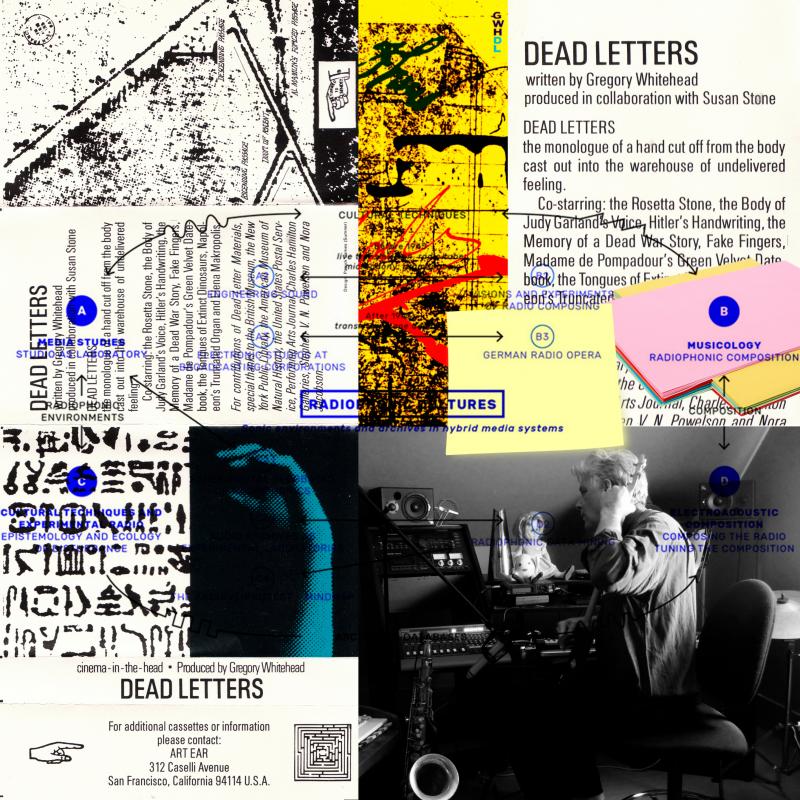Is There Really a Place on Radio for Experimentation?
"Dead Letters" by Gregory Whitehead on Voice (B3 German Radio Opera)
"In 1983, Susan Stone and I received funding from the NPR satellite program development fund for the production of two radio features within a genre we called “cinema in the head”. In my case, this meant an investigation into an assembly of voices, ideas, themes and associations that seemed to belong in the same space, yet had never been properly introduced.
During those years, I was influenced by essayistic films such as Chris Marker’s Sans Soleil (which I still watch once a year or so) and the filmic philosophy of Alexander Kluge. I had also recently finished a master’s thesis about the subjective experience of aurality and literacy, and in particular the work of Walter Ong, whose subtle and deep investigations into the history of the word (and The Word) remains a source of stimulation to this day.
In terms of the production process, I was particularly fascinated by the phenomenology of the analog razor cut as a sort of acoustic emblem for a wounded text; an acoustic text stitched together, where the wounds were active as “mouths” – vulnerable openings among the various floating subjects. Such a text seemed to resonate with the qualities of radiophonic space that have always intrigued me, above all the tense interplay between Eros and Thanatos.
All this led me to visit the New York City Dead Letter Office over the course of several days, watching the small group of skilled decipherers make one last attempt at fulfilling a desired yet possibly doomed epistolary communication. From there, I simply followed whatever associative path was suggested within the language and performance of the interviews themselves.
The editing process was obsessive, as I shaved slivers from slivers to get the rhythm exactly right. Inspired by the dance and music of the Tarantella, the structure circles and spins, offering multiple beginnings and ends; entrances and exits into the warehouse of undelivered feeling."
Gregory Whitehead
Gregory Whitehead is an artist, writer, radiomaker, text/sound poet, singer of tales, playwright and media philosopher. Since his first tape and radio experiments made during the 1980s, he has created a long list of radio plays, hybrid documentaries and acoustic adventures for the BBC, Radio France, Deutschland Radio, Australia’s ABC, NPR and other broadcasters. Often interweaving documentary and fictive materials into playfully unresolved narratives, his aesthetic is distinguished by a deep philosophical commitment to radio as a medium for poetic navigation and free association. In his voice and text-sound works, he explores the tension between a continuous pulse and the eruption of sudden discontinuities, as well as linguistic entropy and decay.
Co-editor of the pioneering anthology Wireless Imagination: Sound, Radio and the Avant-Garde (MIT Press), his philosophical essays and hybrid speculative fictions have appeared in a wide variety of publications.
-
Radio, as a heterogeneous mix of technological progress and aestheticised desire, goes far beyond being merely a medium of communication. This series of podcasts aims to highlight this fact, offering a selection within the wide variety of topics currently being explored, most notably the confluences and limits and the possibilities of dissemination and the presence of silenced histories.
Depending on the chosen historical and theoretical paradigm, multiple and even contradictory histories of radiophony can be constructed. Therefore, research starts from a general corpus of concepts which explore, along with a fascination with the medium, a utopian and unconventional treatment: the "Radio-Eye" and the Radio-Pravda manifesto of Dziga Vertov; the public interaction and communication of Bertolt Brecht; William Burroughs' cut-ups and communicative disruption; Velimir Khlebnikov's "The Radio of the Future"; and the concept "Radio Mind" by psychologist Upton Sinclair. As media theorist Allen S. Weiss states: “Radio is not a singular entity but rather a multitude of radios” and "radiophonia is a heterogeneous field encompassing diverse apparatus, practices, forms, and utopias”.
Opposite the canonisation of the field and radiophonic methods, there are people and collectives that opt to keep margins fluid and encourage participation, reflection and interaction through experimental approaches and applications. To invent and reinvent radio is to approach radiophonic space as a creative space. Thus, the series seeks to establish an open and fragmented dialogue with media artists, creators and thinkers on the relationship between radio, society, technology and experimentation through singular and idiosyncratic radio pieces.

Agnès Pe, collage made from images of projects by Gregroy Whitehead, 2023
Share
- Date:
- 26/09/2024
- Production:
- Agnès Pe
- License:
- Creative Commons by-nc-nd 4.0
Audio quotes
Dead Letters by Gregory Whitehead on Voice (B3 German Radio Opera)
- Gregory Whitehead. Dead Letters (NPR, 1985)
- Gregory Whitehead. If a voice Like, Then that (Tellus Cassette, 1984)
- Gregory Whitehead. Little Tina (WFMU live-to-air screamscape, with Kenny G, 1984)
- Gregory Whitehead. Principia Schizophonica (RRR, 1990)
- Gregory Whitehead. Marinade a la Tete (BBC4, 2000)